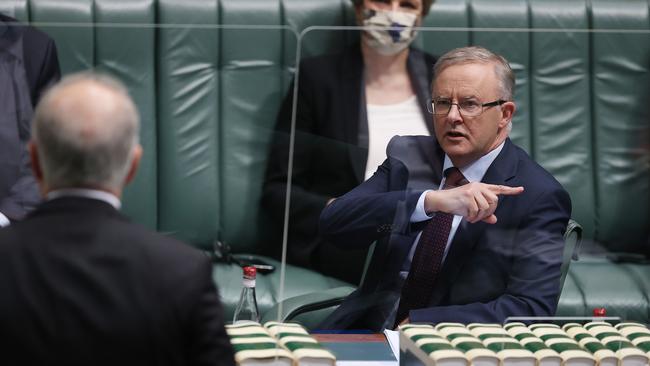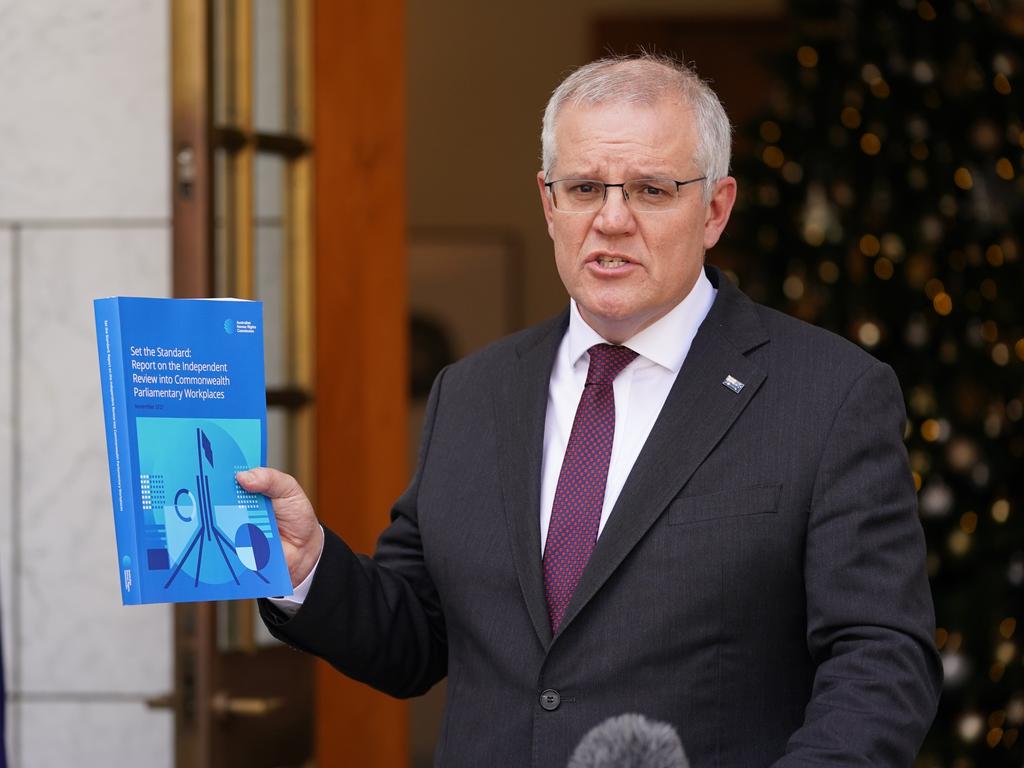Left intelligentsia writes off the PM to its own chagrin
As ALP hardheads surely know, the path to election victory requires ignoring the left about how to campaign against Scott Morrison.

As the hardheads in the Labor Party surely know, the path to victory at the election next year requires not accepting advice from the left intelligentsia about how to campaign against Scott Morrison.
The problem with left-wing intellectuals, in so far as Labor is concerned, turns on the fact that their attitude to the Prime Minister is replete with contempt – a position not shared by all voters.
A couple of examples illustrate the point.
On November 19, well-known publisher and commentator Louise Adler took issue with Morrison’s use of the word denunciating with respect to separating himself from violent protests. Adler tweeted that he had conflated the word denouncing with enunciating. She added: “You don’t need Freud to understand the mixed message.”
This fired up former Canberra press gallery journalist and occasional ABC television Insiders panellist Malcolm Farr, who quoted Adler and added: “Morrison is the shallowest, most demonstrably deceitful, self-important and ill-equipped PM of at least the past 30 years.”
However, it was Adler and Farr who proved shallow on this occasion. Denunciate is a word – and it has been in the Macquarie Dictionary for decades. Perhaps Sigmund Freud provides an explanation for a research failure in this instance. Or perhaps not.
In the Crikey newsletter on Tuesday, media correspondent Christopher Warren wrote about what he termed “the Morrison paradox”; namely, that “perhaps the least substantial three-year PM is suddenly among the most written about”.
Warren was referring to Katharine Murphy’s Quarterly Essay titled The End of Certainty (the same title as Paul Kelly’s 1992 book), Annika Smethurst’s The Accidental Prime Minister, plus Wayne Errington and Peter van Onselen’s How Good is Scott Morrison?
Warren concluded the message from this trio was that the Prime Minister “believes in nothing much, doesn’t know how to get there, and doesn’t really care”. That’s all.
There is a similar message in Sean Kelly’s recently released The Game: A Portrait of Scott Morrison (Black Inc). Kelly, a former journalist and political staff member to Labor prime ministers Kevin Rudd and Julia Gillard, writes a column for Nine Entertainment newspapers.
Put simply, Kelly’s attitude to Morrison is one of contempt. Although, to be fair, he is pluralistic with his disregard. For example, Kelly describes Defence Minister Peter Dutton as “a former police officer from Queensland with a thin bald head that some likened, with unkind accuracy, to a potato”. To members of the left intelligentsia, this may be thigh-slapping funny. To others, it is mere abuse.
Kelly is a Labor person. No problem there. The social democratic tradition is a core part of the Australian system of government. So is the political conservative tradition of the modern-day Liberal Party and Nationals. It is just that many members of the left intelligentsia look down on their opponents for what they regard as their ordinariness.
Kelly asks: “How is it that Morrison repels interest so?” Concerning which it might well be asked: why did the author write a book about so (allegedly) boring a man? Soon after, Kelly opines: “Morrison’s self-preservation as the epitome of traditional Australia means that he also comes across as ordinary, relentlessly so. His musical taste is middle-of-the-road. His interests are unintellectual. His language is banal.”
Elsewhere the author refers to the “Morrison image as a curry-cooking, Sharks-loving, family man”. Which raises the question: what’s wrong with liking curry and barracking for the Cronulla Sharks rugby league team? Indeed, the word curry appears on 18 occasions in this tome.
Your man Kelly is clearly an intellectual kind of guy. His book is replete with psychological references – some might use the term psychobabble. There are references to Janet Malcolm, EM Forster, TM Luhrmann, Lewis Carroll and more besides. Morrison is even compared unfavourably with Shakespeare’s character Macbeth.
In his final chapter, Kelly even tells readers about a “strange dream” he had about Morrison – in which people began mistaking the author for the PM. How fascinating. He claims “this is not an unusual realisation for a writer to have”. Dream on.
The core message of The Game is that Kelly resents Morrison’s pragmatism, religious beliefs and social conservatism. He is, in short, a boring man in a boring country. According to Kelly, “when Australians talk of their history … a vague but encompassing boredom prevents them from listening to the details”.
It is the plight of the alienated Western intellectual to be bored with the contemporary society in which they live privileged lives. But the evidence suggests most Australians are relatively content with their plight. And then there are the millions who want to become Australian citizens.
One of The Game’s chapters is titled Suburban – since one of the reasons the author regards the Prime Minister as boring turns on his suburban tastes in music and other pursuits. However, the outcome of the next election will probably be determined in suburban and regional Australia.
Kelly believes Morrison is a shallow man who is so pragmatic that he believes in nothing. This is a judgment made on the basis of reading Morrison’s speeches and following his media conferences and interviews. But the real criticism turns on the fact that the author does not believe in his subject’s attitude to climate change, asylum-seekers and, more broadly, economic policy.
Indeed, Morrison does not emerge favourably from even one page of The Game – it consists of criticism upon criticism. Yet the reader gets the impression that Australian society is comfortable with what Kelly regards as its leader’s banality – which explains the author’s passive aggression.
There is reason to do so. Labor’s review of its unsuccessful 2019 campaign – conducted by Craig Emerson and Jay Weatherill – found the party failed to identify the risk it faced after Morrison replaced Malcolm Turnbull in August 2018 as prime minister.
In short, in 2019 Labor did not take Morrison seriously enough. Nor did nearly all the Canberra press gallery. Most Australians are pragmatic, not alienated, and they don’t care much about Freud.
Gerard Henderson is executive director of the Sydney Institute. His Media Watch Dog blog can be found at theaustralian.com.au.
More Coverage
Read related topics:Scott Morrison






